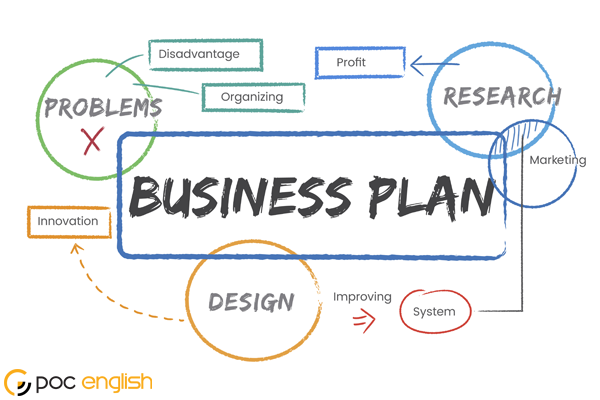Learning about business English vocabulary and phrases is crucial for several reasons. Firstly, it equips you with the necessary language skills to effectively communicate in professional settings. Whether you’re writing emails, participating in meetings, or negotiating contracts, having a good command of business English ensures clarity and professionalism in your interactions. Additionally, understanding business terminology allows you to comprehend documents such as reports, presentations, and financial statements, enabling you to make informed decisions and contribute meaningfully to your workplace.
Moreover, proficiency in business English can significantly enhance your career prospects. Many employers value employees who can communicate confidently and fluently in English, especially in multinational companies where English serves as the primary language of communication. By mastering business vocabulary and phrases, you not only improve your communication skills but also demonstrate your dedication to personal and professional development, making you a more competitive candidate for job opportunities and advancement within your chosen field.
Imagine walking into a job interview armed with the knowledge of terms like ‘resume’, ‘networking’, and ‘deadline’ – it instantly sets you apart. Then there are soft skills like ‘teamwork’ and ‘leadership’ that employers highly value. Understanding concepts like ‘profit’, ‘market research’, and ‘customer service’ empowers you to navigate the business landscape. So, whether you’re dreaming of a startup or climbing the corporate ladder, mastering this vocabulary is like having a powerful tool in your arsenal. It’s not just about sounding professional; it’s about understanding and thriving in the world of business.
Are you ready to learn about business English phrases ?
In this lesson, we are going to read a dialogue and then learn the new phrases and vocabulary. Are you ready? Let’s get started!
Improve business English vocabulary with this dialogue
Imagine that a boss is talking to his manager, Bob.
- Bob! I hate to break the news, but our sales were down again last month.
- Down again, Maddy?
- These days, everybody is shopping from our competitor, Joey’s furniture store.
- But everything in there costs an arm and a leg!
- That’s true. They charge top dollar.
- And their salespeople are very strange! They really give me the creeps!
- Well, they must be doing something right over there. Meanwhile, we’re about to go belly up.
- I’m sorry to hear that! I thought my new advertising campaign would save the day!
- Let’s face it! Your advertising campaign was a disaster.
- Well, then I’ll go back to the drawing board.
- It’s too late for that. You are fired.
- What? Are you giving me the ax?
- Yes, I have already found a new manager. She’s as sharp as a tack.
- Can’t we even talk this over? After all, I’ve been working here for 10 years!
- There is no point in arguing Bob! I have already made up my mind.
- Oh well, at least I won’t have to put up with your nonsense anymore! Good-bye to you and goodbye to this dead-end job!
- Please leave before I lose my temper.
Now, it’s time to learn the new words of business English vocabulary list.
1. To break the news
“To break the news” means to tell bad news, to tell somebody something bad. For example:
- I don’t know how to break the news to her. ( I don’t know how to tell her the bad news.)
- She was diagnosed with cancer and the doctor broke the news to her family.
2. To cost an arm and a leg
When something costs an arm and a leg it means that it’s very ridiculously expensive. For example:
- The coat cost him an arm and a leg! (The coat was really expensive.)
Learn more: What are adjectives and adverbs in English?
3. Top dollar: Of business English vocabulary
“Top dollar” is another item of business English vocabulary list which is an informal phrase. It means a very high price.
- I pay top dollar for my classes. ( I pay a very high price for my classes because I love them.)
- They charge top dollar for their service.
4. Something/somebody gives you the creeps
When something or somebody gives you the creeps, it means that it makes you feel nervous or afraid.
- I really hate snakes they give me the creeps!
Learn more: The most common personality adjectives in English
5. To be about to: Of business English phrases
“To be about to” means to be ready to, to be going to happen soon. Don’t forget that instead of “to be” you can use “am, is, are, was, were”.
- The ceremony was about to begin. (It was time for it to start.)
- He is about to get mad. (he is not mad yet, but he is close to become mad.)
Now, I am about to teach you the next item of business English phrases.
6. To go belly up
“To go belly up” means to go bankrupt. If a company goes bankrupt, it means that the company is not able to pay its debts and has to shut down.
- The company was about to go belly-up. (The company was so close to going bankrupt.)
7. To save the day
“To save the day” means to do something to stop a failure, which is in the business English vocabulary list. For example:
- The company was about to go belly-up but the advertising campaign saved the day. (The advertising campaign prevented the bankruptcy.)
- The other day, we were playing soccer and we were losing. But my last-minute goal saved the day!
Watch this short video
8. Let’s face it : Of business English vocabulary
“Let’s face it” means let’s be realistic, let’s accept the bitter truth, and let’s accept a difficult reality.
- Let’s face it, moving to a new house was a bad decision. (Let’s accept that we made a bad decision by moving to this house.)
9. Back to the drawing board
This is a very common item of business English phrases list. We use it when an idea hasn’t been successful and you need to come up with a new one. (Let’s start from the beginning.)
- The government’s tax policy was a failure so they had to go back to the drawing board.
10. To give somebody the ax
As you may know, “ax” is a tool and we use it when we want to cut firewood. But to give somebody the ax means to fire somebody or to dismiss somebody from his/her job.
- His boss gave him the ax. (his boss fired him.)
11. As sharp as a tack
When someone is as sharp as a tack, it means that he/she is very smart. For example:
- The new manager is as sharp as a tack! Perhaps she can save the day and stop the company from going belly-up!
12. To talk something over
This one is a phrasal verb and it means to discuss something with someone else in order to understand their opinion about that.
- The employees had 2 weeks to talk the proposal over with their families. (They had 2 weeks to discuss it with their families.)
13. After all: Of business English phrases
We use “after all” at the beginning of a sentence and it means “as a matter of fact” or “the fact is”. For example:
- You should invite her to your wedding, after all, she is your best friend.
- I know I’m a good teacher. After all, I have almost 500k subscribers, now!
14. There is no point in something
This phrase means that there is no reason to do something, it is not worth doing something. for example:
- There is no point in worrying about the things you can’t change.
15. To make up your mind
“To make up your mind” means to make a decision or to decide. For example:
- He finally made up his mind to attend the meeting. (he finally decided to go to the meeting.)
- I have finally made up my mind, I wanna get married.
Learn more: Read the article about formal and informal words in English
16. To put up with something/ somebody
“To put up with something/ somebody” means to tolerate sth/sb without complaining.
- I can’t put up with my boss, I wanna quit. (I cannot tolerate my boss anymore, I just wanna quit.)
17. Dead-end : In the business English vocabulary list
When you are talking about a dead-end job, you are talking about a job without any future prospects, with no room for improvement. For example:
- He realized that working at that restaurant was a dead-end job.
18. To lose somebody’s temper
When someone loses their temper, it means that they become angry.
- When I arrived late, my boss lost his temper.
Watch these two short videos
Let’s learn new business English vocabulary:
I really want to start my own business. So, I ask a friend of mine who is a business owner, for some advice. Let’s see what he has to say:
- The first thing you need is a business plan. If you are on a tight budget, you may be able to put forward your business plan to a bank manager to take out a loan. But remember, launching a new business is very risky, so do proper market research!
Let’s have another look at the text.
19. A business plan
A business plan is a plan showing the future objectives of a business and strategies on how to achieve them.
20. To be on a tight budget
What does it mean to be on a tight budget? “To be on a tight budget” means that you don’t have much money to start a business.
21. To put forward
“To put forward” means to propose, to submit for someone else’s consideration.
22. To take out a loan
What is a loan? A loan is the money you borrow from the bank to start your own business or do something with it.
*Tip: the verb we use with “loan” = Take out
So “to take out a loan” means to ask the bank to give you some money so that you can start your own business.
23. To launch a business
“To launch something” means to start it for the first time or to initiate it.
24. Market research
“Market research” means gathering information about your potential customers and the consumers’ needs and desires.
A quick observation on the word “risk”
As you might know, “risk” is a noun but it also can be a verb and its adjective is “risky”. What adjectives can we use with the noun “risk”?
If the risk of something is big → substantial risk, major risk, considerable risk, grave risk
What verbs can we use with “risk”?
Risk → to take a risk, to face risks, to entail risks
You can mix them together and make interesting sentences. For example:
- Starting a business entails considerable risks!
- As a new business owner, you need to face grave risks!
Now let’s go back to my friend and see what else he would advise us:
- After you set up your firm, you can start rolling out new products. Before you start manufacturing your products, make sure you have enough potential customers. Remember, you have to give priority to your customers. Customer care is crucial for any successful business!
Learn more: Get familiar with the English restaurant vocabulary
Let’s have another look and learn the new words!
25.To set up a firm
“Firm” is another word for company or business. “To set up a firm” means to establish your firm, to establish your business, to launch your business.
26. To roll out new products
“To roll out new products” means to officially launch and introduce new products.
27.To manufacture
“To manufacture” something means to mass produce something, using machinery. For example:
- He works for a company that manufactures car parts.
28. Potential customers
As you might know, “customers” are the people who buy and purchase your products. A “potential customer” is a customer who may be willing to buy your product.
29.To give priority to someone
“To give priority to someone or something” means to consider it more important than other things. So, to give priority to customers means considering them more important than other people.
30. Customer care
“Customer care” means listening to your customers, taking care of your customers, and supporting your customers.
Learn more: Get familiar with the formal phrases in English
What is a CEO?
CEO stands for chief executive officer which is the highest rank in an organization. It basically means the boss. Now, a CEO is going to give us 4 tips about starting a business.
- When you start, you have to build contacts. That’s crucial!
- You may not make a profit immediately, so be patient!
- You will face stiff competition!
- Get regular feedback from your customers!
And now let’s analyze the tips to learn the new vocabulary.
31. To build contact
“Contact” is basically all the people, all the businesses, or all the suppliers that you as a business owner have a relationship with. “To build contact” means to grow your network or to become familiar with more and more business owners and suppliers.
32. Crucial
“Crucial” is a noun and it means very important. For example:
- It’s crucial that we arrive before 8 o’clock.
33. To make a profit
Imagine that you have a company that produces joysticks. The cost of production of one joystick is $100. You sell this joystick for $150 and your profit is $50. So, “profit” is the money you receive apart from the cost of production.
“To make a profit” means to earn that amount of money.
34. To face stiff competition
“Competition” is the effort of other businesses to win your potential customers.
*Tip: the verb we use for “competition” → face
“To face stiff competition” means to compete with other opponents (businesses) who try to win your potential customers.
35. To get feedback
“Feedback” is asking your customers for their opinion. With questions like “how was my product?”, “was it easy to purchase this product?”, etc. you can get feedback from your customers.
*Tip: the verb for feedback → ask for feedback, get feedback
*Tip: Feedback cannot be a plural noun. (feedbacks)
A very common mistake!!!
Is the word “business” countable or uncountable? Well, the answer is both!
Look at this sentence:
- We hope to do more business in Europe.
In this case “business” is countable. But why? Because in this sentence, “business” refers to the activity you are carrying out.
However, look at this sentence:
- There are many new businesses online.
In this case, “business” is countable because it doesn’t refer to the activity. It refers to the firms, organizations, or companies.
So, to summarize:
Business (activity) → uncountable
Business (entity, firm, company) → countable
Watch this video
Learn more: Learn about the most common illness vocabulary in English
36. To get the ball rolling
Meaning: To formally start a (business) meeting.
Example: Are all the members present? Ok, let’s get the ball rolling.
37. To bring something to the table
Meaning: To come up with new ideas in a meeting.
Example: Ok John. What have you brought to the table?
38. To keep someone in the loop
Meaning: to give someone enough information about what is going on in the meeting to let him/her participate in the decision-making process.
Example: Sorry for being late. Would you please keep me in the loop?
39. To set a deadline
Meaning: To determine a time for finishing a work or a project.
Example: We need to set a deadline to finish this project as soon as possible.
40. To meet a deadline
Meaning: To finish a project on time.
Example: Unfortunately, we couldn’t meet the deadline and we failed.
41. To stay on budget
Meaning: Not spending more money than had been planned for.
Example: You have spent much more money than we planned. Your company failed to stay on budget.
42. To go over the budget
Meaning: To spend more money than had been planned for.
Example: We should be so careful not to go over the budget for the project. It’s our last chance.
43. To go bankrupt
Meaning: To be unable to pay one’s debts.
Example: Many farmers in Ukraine could go bankrupt.
44. To be in red
Meaning: To have no money.
Example: Boss! We are in the red. We are going to go bankrupt. (You can refer to the colorful expression video)
Now we are going to use these business English phrases in a conversation:
A: Ok. Let’s get the ball rolling. We are in an emergency. We couldn’t stay on budget for some important projects. We also have failed to meet deadlines. We are in the red and …..
The Boss enters the meeting:
Boss: Sorry Gentlemen! Would you please keep me in the loop?
A: I was saying. We are going to go bankrupt.
Boss: I have some new ideas. But before that, I want to know what you have brought to the table.
45. To outsource an activity
Meaning: To be done by outside or foreign workers.
Example: The US tech companies are outsourcing most of their activities to Asian factories.
46. To sign off on
Meaning: To give approval to something.
Example: The boss needs to sign off on the new project
47. Train of thought
Meaning: A series of thoughts or ideas that someone is having.
Example: Would you please not interrupt? I lose my train of thought.
48. To be ahead of the curve
Meaning: To be ahead of current thinking or trends.
Example: We are fortunately ahead of the curve in terms of technological innovations.
49. To corner the market
Meaning: To take control of the market.
Example: By taking this policy we can corner the market easily.
50. To look at the big picture
Meaning: To consider the most important factors affecting the current situation.
Example: When we look at the big picture lack of good workers is the main problem.
Now let’s continue the previous conversation and uses these idioms:
C: I believe we need to outsource some of our activities to Asian countries. The labor is so cheaper there.
Boss: That is a good idea. I will sign off on that.
B: Besides, we are ahead of the curve in terms of technological innovation in the market. We can also use this opportunity and corner the market.
Boss: But if we look at the big picture, the problem is in the production sector.
51. From the ground up
Meaning: From the beginning.
Example: We have run this company from the ground up.
52. C-level positions
Meaning: High-ranking positions in the company. Such as CEOs, CFOs, CIOs.
Example: John has recently got a promotion to a C-level position.
53. To climb the career ladder
Meaning: To improve your position in your job.
Example: Jack has climbed the career ladder very fast. He has a C-level position after just four years working in this company.
54. To brush up on
Meaning: To improve your skills or your ability in your job.
Example: You need to brush up on your skills if you wish to get a promotion in your job.
Now it’s time to put these phrases into practice. Shall we?
A: Congratulations David. You really deserve your new position. Getting a C-level position in this company is really hard.
B: Thanks, John. That’s very kind of you. But I am not satisfied with it.
A: Come on. You’re climbing the career ladder very soon.
B: I am thinking about brushing up on my skills and running my own company from the ground up.
Watch this video
Let’s learn about the most common business vocabulary used in IT engineering.
It business English vocabulary
If you are an IT engineer or a student in this field, the following list is for you:
Algorithm
Meaning: A set of instructions or rules designed to solve a specific problem or perform a particular task, often used in programming and data analysis.
Database:
Meaning: A structured collection of data stored electronically in a computer system, organized in a way that allows easy access, retrieval, and management.
Cybersecurity:
Meaning: The practice of protecting computer systems, networks, and data from unauthorized access, cyberattacks, and other security breaches.
Cloud Computing:
Meaning: The delivery of computing services (such as storage, servers, databases, networking, software, and analytics) over the internet, allowing users to access resources on-demand without the need for local infrastructure.
Artificial Intelligence (AI):
Meaning: The simulation of human intelligence processes by machines, including learning, reasoning, problem-solving, perception, and language understanding, often used in applications such as chatbots, recommendation systems, and automation.
Encryption:
Meaning: The process of converting data into a code or cipher to prevent unauthorized access, ensuring confidentiality and security during data transmission or storage.
Agile Methodology:
Meaning: An iterative approach to software development that emphasizes flexibility, collaboration, and rapid delivery of functional software increments, allowing for quick adaptation to changing requirements and feedback.
User Interface (UI):
Meaning: The graphical layout and elements (such as buttons, menus, icons, and screens) that allow users to interact with a software application or system.
Big Data:
Meaning: Large and complex datasets characterized by their volume, velocity, and variety, often requiring advanced techniques and technologies for storage, processing, and analysis to extract valuable insights and patterns.
Virtualization:
Meaning: The creation of a virtual version of a resource or device, such as a server, storage device, network, or operating system, enabling multiple virtual instances to run on a single physical hardware, thereby maximizing resource utilization and flexibility.
At the end of this part of article, we are going to evaluate our learning by taking a short quiz:
Quiz
If we intend to ….. we should brush up on our skills seriously.
⚪️sign off on
⚪️climb the career ladder
⚪️outsource our activities
Most of the companies in the country are in the red and …
⚪️Stay on the budget
⚪️Corner the market
⚪️Going to go bankrupt
Summary of the lesson: Business English vocabulary
Let’s review the business English phrases that we learned in this lesson.
| To break the news | A business plan |
| To cost an arm and a leg | To be on a tight budget |
| Top dollar | To put forward |
| Something/somebody gives you the creeps | To take out a loan |
| To be about to | To launch a business |
| To go belly up | Market research |
| To save the day | To set up a firm |
| Let’s face it | To roll out new products |
| Back to the drawing board | To manufacture |
| To give somebody the ax | Potential customers |
| As sharp as a tack | To give priority to someone |
| To talk something over | Customer care |
| After all | To build contact |
| There is no point in something | Crucial |
| To make up your mind | To make a profit |
| To put up with something/ somebody | To face stiff competition |
| Dead-end | To get feedback |
| To lose somebody’s temper |




















